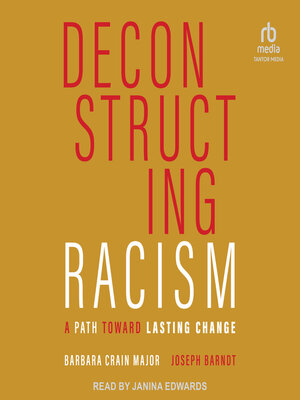
Sign up to save your library
With an OverDrive account, you can save your favorite libraries for at-a-glance information about availability. Find out more about OverDrive accounts.
Find this title in Libby, the library reading app by OverDrive.



Search for a digital library with this title
Title found at these libraries:
| Library Name | Distance |
|---|---|
| Loading... |
Barbara Crain Major and Joseph Barndt bring ninety combined years of experience as community organizers, teachers, and anti-racism trainers in community and church settings to this book. In Deconstructing Racism, they propose the deconstruction of racism's roots within systems and institutions that have been created, both structurally and legally, to serve white people.
The authors seek to unmask the complexities of racism and the invisible patterns that keep it in place. There is no quick fix, but they believe racism can be deconstructed and undone. In order to do this, they identify and address race-based identity, history, and cultural issues rooted in current systems.
Three chapters specifically address societal systems and provide anti-racism strategies for community organizers. Three chapters address racism as rooted in systems in the church and challenge people of faith to seek racial healing through understanding, honest confession, true reconciliation, and reconstructed church institutions. A final chapter outlines a way forward to and through a new era of anti-racist reconstruction. This way forward includes a new anti-racist mission statement, a new model of decision-making power, and new processes for accountability.
The authors seek to unmask the complexities of racism and the invisible patterns that keep it in place. There is no quick fix, but they believe racism can be deconstructed and undone. In order to do this, they identify and address race-based identity, history, and cultural issues rooted in current systems.
Three chapters specifically address societal systems and provide anti-racism strategies for community organizers. Three chapters address racism as rooted in systems in the church and challenge people of faith to seek racial healing through understanding, honest confession, true reconciliation, and reconstructed church institutions. A final chapter outlines a way forward to and through a new era of anti-racist reconstruction. This way forward includes a new anti-racist mission statement, a new model of decision-making power, and new processes for accountability.







